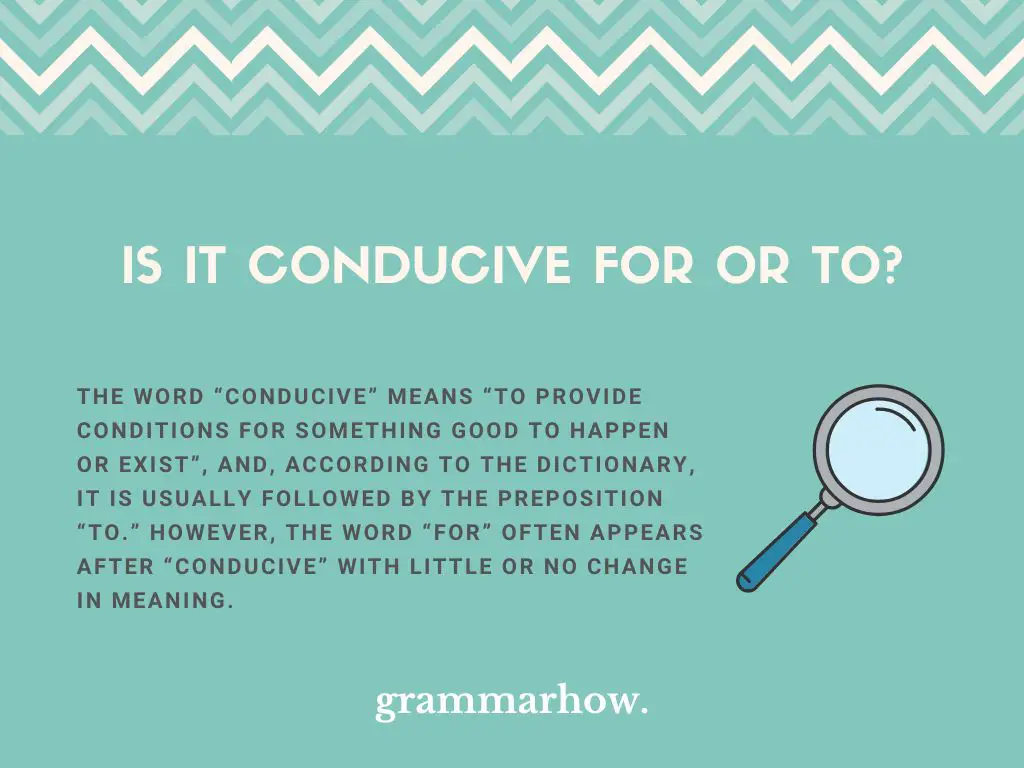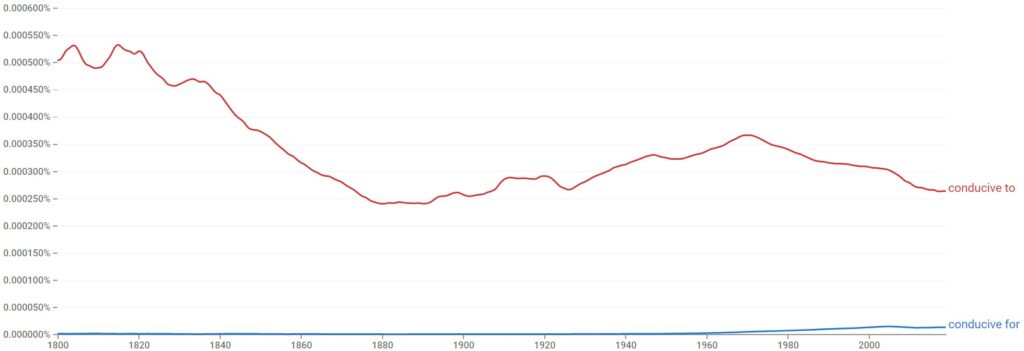The terms “conducive for” and “conducive to” appear very similar, and you have wondered what the difference is. This page explains each term and provides examples so that you can see the words in context.
Is It Conducive For or To?
The word “conducive” means “to provide conditions for something good to happen or exist”, and, according to the dictionary, it is usually followed by the preposition “to.” However, the word “for” often appears after “conducive” with little or no change in meaning.

According to the Cambridge Dictionary, the word “conducive” means to offer conditions that lead to some type of good or benefit being achieved, which could be tangible or intangible.
The Merriam-Webster Dictionary states that “conducive” relates to something that “promotes or assists” another activity or state. It also mentions that “conducive” is almost always followed by the word “to.” So
So the word conducive essentially refers to “something that makes something else easier to happen.” However, whilst the dictionary states that “conducive” relates to some type of “good” result, there are multiple examples where the result is not good, and the term is essentially used to mean something that “facilitates” something else.
The two prepositions could be used interchangeably with no difference in meaning. However, the preposition ”to” tends to be regarded as the original and preferred option.
Conducive For
The term “conducive for” is used to express that something “causes” something else to happen, which is often, but not always, something beneficial or positive. It is a slightly less popular synonym of “conducive for”, and there is no real difference in meaning between the two terms.
Here are some examples of how “conducive for” can be used in a sentence:
- Inner city deprivation is conducive for high crime and unemployment.
- The climate in the Sonoran Desert is conducive for the growth of many species of cacti.
- The setting he grew up in was not conducive for a good education.
- We want to make the application process more conducive for people with disabilities.
Conducive To
The phrase “conducive to” refers to “something that makes something else easier to happen” and is a synonym of “conducive for.”
The preposition “to” is listed in most major dictionaries, such as the Merriam-Webster Dictionary, as the preposition to follow the word “conducive”; however, there are occasions when people use “for” and there is no difference in meaning.
Also, whilst dictionaries state that “conducive to” usually refers to something beneficial, in everyday use, the term refers to both good and bad situations.
Here are some examples of how to use “conducive to” in a sentence:
- The current government is not conducive to the good of the country.
- I want a company environment which is conducive to my professional advancement.
- Many modern tv shows are not conducive to intellectual growth and are merely entertainment.
- Constant war and conflict are not conducive to fundamental human rights and equality.
Which Is Used the Most?
The Google Ngram shows that since 1800 the term “conducive to” has always been more popular than “conducive for”, which only began to grow in usage in the 1970s.

“Conducive to” fell in popularity between 1800 and 1900 and has since increased in frequency over the last 100 years. There is also no variation between British English and American English, with both countries displaying the same trend.
Final Thoughts
The terms “conducive to” and “conducive for” and synonyms and can be used interchangeably. However, most dictionaries state that to” is the more common preposition to follow “conducive” and is the “standard” choice.

Martin holds a Master’s degree in Finance and International Business. He has six years of experience in professional communication with clients, executives, and colleagues. Furthermore, he has teaching experience from Aarhus University. Martin has been featured as an expert in communication and teaching on Forbes and Shopify. Read more about Martin here.
